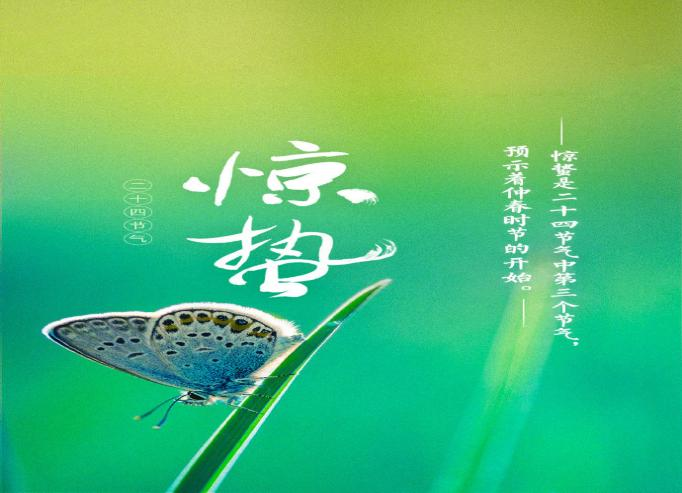发布日期:2024-03-20 14:32
An Introduction to Chinese Solar Terms--- Awakening of Insects

Awakening of Insects ,also known as Jingzhe, is one of the 24 solar terms, marking the third solar term of spring. It occurs around March 5 or 6 every year and represents the transition period from cold winter to warm spring. As the name suggests on this day, insects wake up from the winter slumber, start to stir and come back to life, but it’s not just bugs and bees waking up, this solar term makes the rebirth of all life on earth. Ancient wisdom tells us that from this solar term peach blossom begin to unfurl gently accompanied by the gradually emerging of chirps of birds. As thunder rumbles in the distance, the entire world revives with the rhythm of life.
In traditional Chinese culture, Awakening of Insects is an important solar term, according to which people will arrange their farming activities and adjust their eating habits. For example, during the Awakening of Insects, people pay attention to maintaining diseases, and also start planting spring crops to lay the foundation for agricultural production throughout the year.
In short, Awakening of Insects is an important solar term that marks the coming of spring the recovery of everything. People should adapt to the natural environment according to the changes of solar terms, keep healthy and promote the development of agricultural production.
惊蛰是二十四节气之一,是春天的第三个节气。它出现在每年的3月5日或6日左右,代表着从寒冷的冬天到温暖的春天的过渡期。顾名思义,在这一天,昆虫从冬天的睡眠中醒来,开始活动并复活,但这不仅仅是虫子和蜜蜂醒来,这个节气使地球上所有的生命重生。古老的智慧告诉我们,从这个节气开始,桃花开始轻轻地展开,伴随着鸟儿的鸣叫声逐渐出现。远处雷声隆隆,整个世界随着生命的节奏而复苏。
在中国传统文化中,惊蛰是一个重要的节气,人们会根据它来安排农事和调整饮食习惯。例如,在昆虫觉醒期间,人们要注意养生防病,也开始种植春季作物,为全年的农业生产奠定基础。
简而言之,惊蛰是一个重要的节气,标志着春天的到来,万物复苏。人们应该根据节气的变化来适应自然环境,保持健康,促进农业生产的发展。

